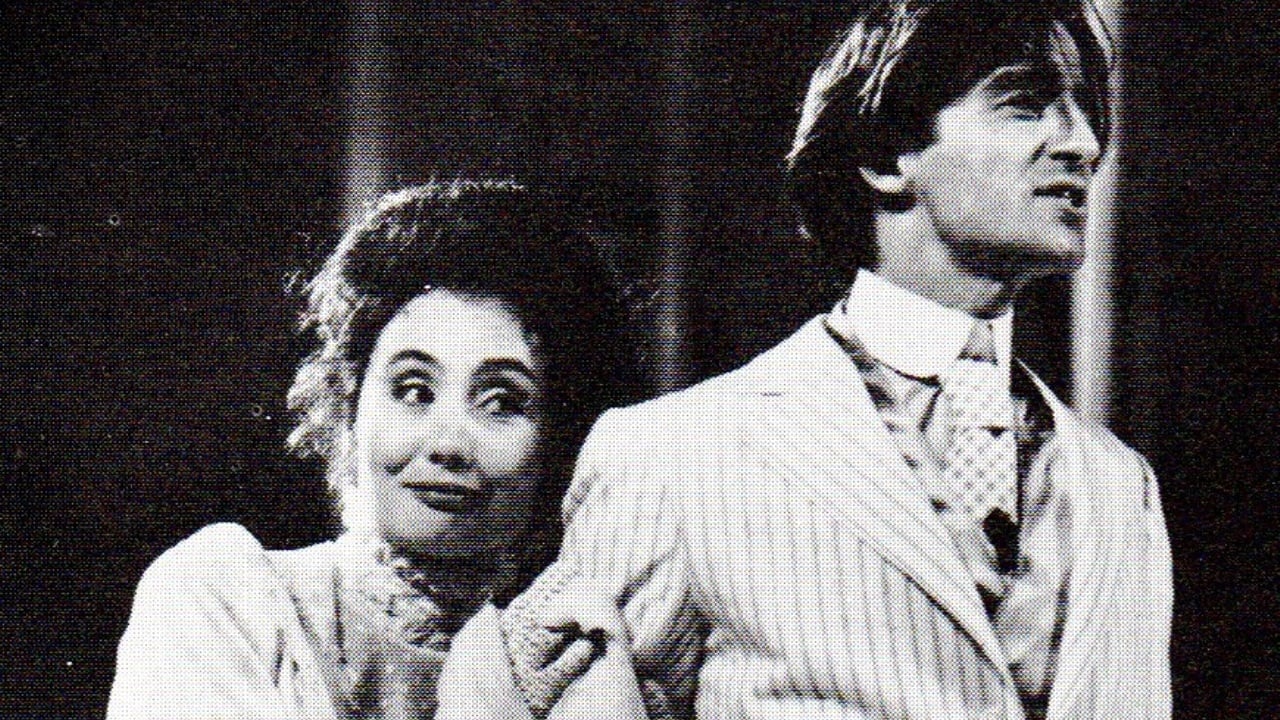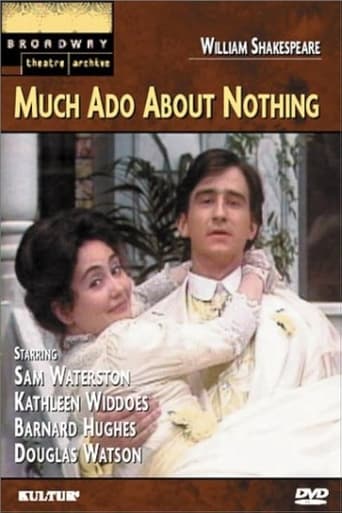

SERIOUSLY. This is what the crap Hollywood still puts out?
... View MoreExcellent characters with emotional depth. My wife, daughter and granddaughter all enjoyed it...and me, too! Very good movie! You won't be disappointed.
... View MoreEach character in this movie — down to the smallest one — is an individual rather than a type, prone to spontaneous changes of mood and sometimes amusing outbursts of pettiness or ill humor.
... View MoreI think this is a new genre that they're all sort of working their way through it and haven't got all the kinks worked out yet but it's a genre that works for me.
... View MoreI'll be honest, I haven't seen this in years and didn't know you could even buy a DVD copy (and I'm definitely asking for this for my next birthday!). I first saw this in 1973, on PBS and fell in love with both the play and Sam Waterston (at the time, an unknown minor off- Broadway actor)! I was 17 at the time, LOL.Normally, I'd probably not bother to review something this slight and 40 years old, but I was taken aback by the cruel reviews of this piece on IMDb.....for starters, people are reviewing it as if it were a poorly made FILM. It is not a FILM. It was an off-Broadway Shakespeare production (by the famous Joe Papp, no less) that was such a minor hit in its day (FOUR DECADES AGO), that PBS had it filmed for their well-received series, Theatre In America.This was a WONDERFUL series, back then, that let Midwestern kids like me -- who were not ever going to get to go to NYC to enjoy these productions -- see them filmed for television. (I assume this was done near the end of their run, so as not to cannibalize ticket sales.) They were never, ever intended to be movie versions -- they were quite consciously filmed in a manner to capture how they were as STAGE PLAYS, and done for public television.I saw some wonderful stuff this way, back in the early 70s, including an ingénue Meryl Streep in "Uncommon Women and Others" by Wendy Wasserstein. But my favorite of all these, was "Much Ado About Nothing".It is unfair to compare this to a $30million modern MOVIE, such as the one with Kenneth Branaugh (which is fine, though not remarkable in any way). It simply could have never had the production values or budget of such a film. I would guess it was videotaped by a single cameraman right on the stage! It is more fair to look at this as if it were a rare, treasured chance to see a 1970s Joe Papp production, as if it were captured in a time machine. A production that only a handful of theatre-goers had the privilege of seeing as it was produced. What a cheap shot it is to scorn this lovely production, for not being a big budget Hollywood film!That being said: I still hold this to be one of the most charming adaptations of the play I have ever seen, and I've seen it at least a dozen times on stage, as well as major movie versions. The choice of the early 20th century, post Spanish American War is inspired -- it also places the date as 1898 if any cares - -and the stage version is rich in period detail, men in straw hats and striped blazers, ladies sneaking cigarettes in greenhouses, bicycles and rowboats.A very young Sam Waterston and Kathleen Widdoes really shine in these parts, not the least because the setting removes all the stuffy Elizabethean fussiness, and lets them use American accents, and a natural way of speaking. There is a very excellent supporting cast with Barnard Hughes and Douglass Watson (Watson and Widdoes went on to long careers in the soaps, but were first and foremost stage actors).Someone mentioned F. Murray Abrams, but I don't remember him or see him listed -- must have been a non-speaking walk-on part. Remember -- this was 1972!!!I am delighted this enchanting production was saved on video tape. Please enjoy it for what it is, and the charm and delightful performances, and don't try and compare it to a multi- million dollar film. Indeed, I have found that some Shakespearan plays really do work better on stage (or in simple videotapes of stage productions) than the big budget blockbusters -- that is how they were DESIGNED to be seen. The delicate comedy is often lost on the big screen.Lastly: there are so many thousands of productions (film, stage, school) of every Shakespearean play -- and for four hundred years! -- that you can have MORE than one good or valuable version of each play. It isn't tit for tat; that this is a lovely production doesn't take away from the Branaugh version and vice versa. Each play is capable of being interpreted in MANY different ways, and it is only after seeing many different versions that you can fully appreciate the genius of Shakespeare, that his work is so infinitely adaptable.
... View MoreI've seen quite a few productions of Much Ado, both on film/TV and on stage and I must say this Joseph Papp production with Sam Waterston and Kathleen Widdoes is my absolute favorite. The time period is perfect. And they really used the period and the setting extremely well. Using the Spanish American war as inspiration was...inspiring. Beatrice is both strong and feminine. I think my favorite part is when Beatrice is eavesdropping in the conservatory and the sprinklers come on. While shot on a set, you can still see the roots this production had as a stage play. But that isn't lost when it's brought to the screen. The setting allows for more flexibility in shooting angles and close-ups, but you still get a sense of the intimacy of a stage production. I say "bully!" Two thumbs up.
... View MorePainful. Painful is the only word to describe this awful rendition of such a fun and interesting Shakespearean play. I gave it a shot but was terribly disappointed and couldn't bare to even finish viewing it. To the person who wrote a novel about how wonderful this twist of Much Ado was, I pity you and your bored brain. May your pretenses about young viewers be lifted without retribution. Please do not even bother with this gut wrenching, disgusting excuse for a performance of an acclaimed Shakespeare drama. You will be forced to induce vomiting and will require a commode close to the television with which you choose to watch this crap because involuntary defecation will take place.
... View MoreMUCH ADO ABOUT NOTHING is considered by Shakespearean Scholars to be one of three plays call the "Joyous Comedies". The other two are AS YOU LIKE IT and TWELFTH NIGHT, and the subject of them is either joy of living or love. They are considered a high point in Shakespeare's development as an artist on par with his dramatic height in his tragedies of the same period (HAMLET, MACBETH, OTHELLO, KING LEAR). And yet, while college courses spend time teaching TWELFTH NIGHT and MUCH ADO and AS YOU LIKE IT to the public, most people who like theater think that Shakespeare's best comedy was the earlier A MIDSUMMER'S NIGHT'S DREAM. TWELFTH NIGHT is revived more frequently than the other two joyous comedies, but A COMEDY OF ERRORS or THE TAMING OF THE SHREW (politically incorrect as the latter is now) are more popular.The problem with MUCH ADO is that it's great wit is hidden by the style of Shakespeare's writing. He was always mixing styles of humor, from low types like Bottom to the height of witty conceits. The early Shakespeare, like his contemporaries, was impressed by John Lily's EUPHUES, an early comedy of puns and word plays. Shakespeare, of course, could knock this off quickly - but the problem of dealing with this is that (except for those lines based on sexual punning) most of his references are so obscure that one needs some type of guide to explain them. This is particularly the case when dealing with Beatrice and Benedict and their wit duels. Most audiences these days can't follow them too well. So the presentation of the amusement has to beef up that portion.This particular production was produced by Joseph Papp in 1973, and I was lucky enough to see it when my college offered it as a free trip to the city. As I had a Shakespeare course at the time, it fit in well.The cast was made up of New York theater and television figures. Today, the actor playing Benedict (Sam Waterston) is the best known (as is F. Murray Abraham, here in a minor part), because Waterston is A.D.A. McCoy on LAW AND ORDER, and Abraham is an Oscar winner and a star of Broadway productions (ironically in another Shakespeare "comedy" right now: THE MERCHANT OF VENICE). But in 1973 the soap opera performers Douglass Watson and Kathleen Widdowes (as Don Pedro and Beatrice) were better known to local audiences, and Bernard Hughes (as Constable Dogberry) was developing a prominence in television and the movies (his best known film role was as the deadly avenging patient in Patty Chayevski's THE HOSPITAL (1971)). The production made sure that the story (originally in an Italian principality in the Rennaisance) was reset in the U.S. during the aftermath of the Spanish American War.The production had it's rewards. Little bits of business stick to the mind - like Widdowes and her girlfriends stealing puffs from a regular tobacco cigarette in 1900 (something unheard of among good young ladies - but Beatrice, after all, is somewhat daring. Waterston, going canoing and paddling backward (the canoe was on a turntable on stage), getting out, and then hiding behind the upright canoe, as though it is leaning against a tree (and it is not fooling the other actors on stage). But best in the production was Hughes as the impossibly dense policeman, who has a "Keystone Kop" force to assist him in seeking out the criminals. Up to his last line, when he announces he has captured the ringleader and has put his hands in a pair of MONACLES (not manacles) Hughes acted like he was Ford Sterling returned to life. Note should also be taken of the late Jerry Mayer as the bad natured Don Juan, who when thwarted in one evil plot at the start gave one of the funniest hissy fits on record.Most of these items were in the film version as they were on the stage. The production was a good one, though nothing remarkable. I would recommend seeing the video of the production, to enable one to see a good cast at work in an interesting concept for the production. But if one wants to understand the verbal jousting of the two lovers, read the play and follow the glossary of terms that are included.
... View More